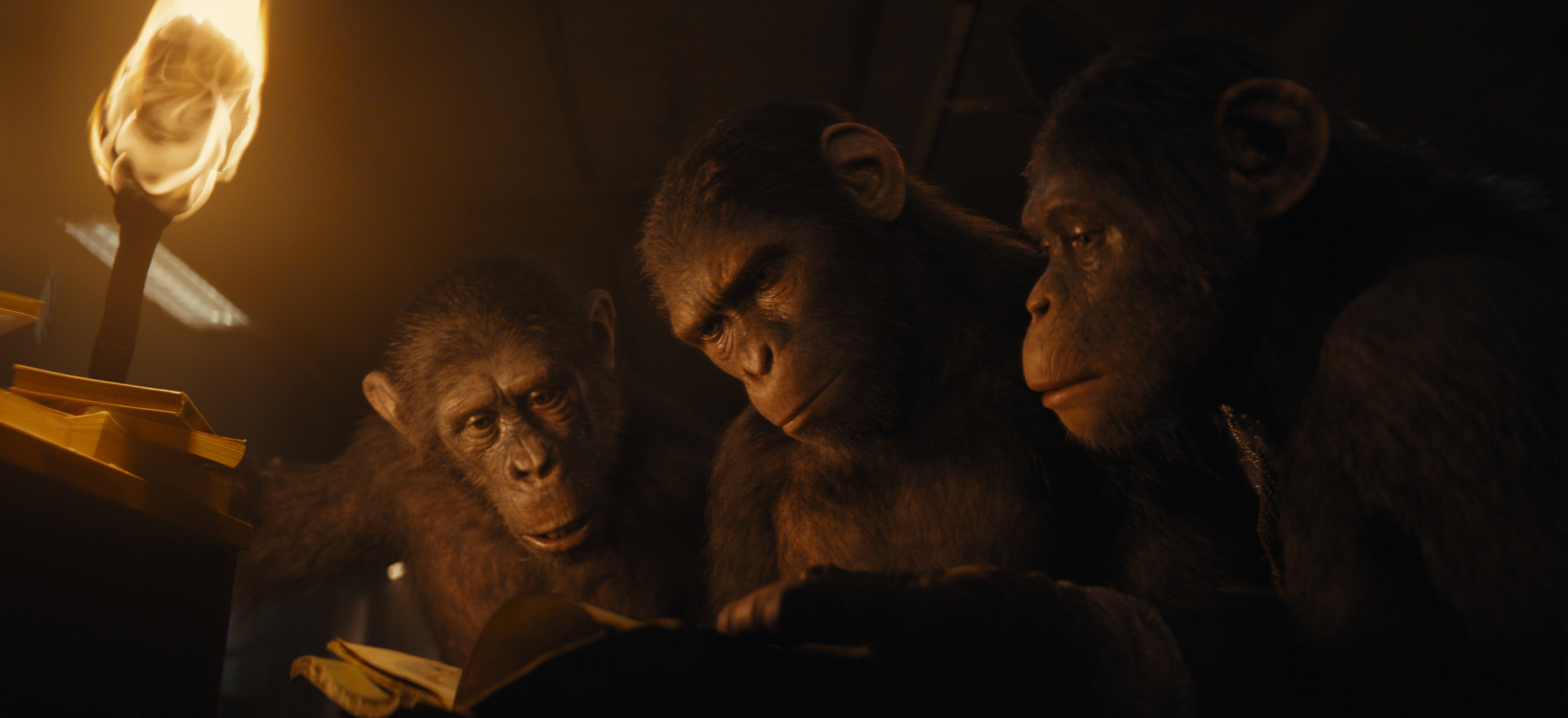Strange thing: The recent 2011-17 films in the “Planet of the Apes” franchise, now joined by the chapter opening this week, follow a similar narrative cycle of peril, punishment, survival. And yet these these movies, spaced out in ways Marvel never learned to respect, feel just fresh enough to matter — as long as you don’t mind the adverb “grimly” in front of a word like “compelling.”
“Kingdom of the Planet of the Apes” leaps roughly 300 years into the future, after the death of the great Caesar, rough-hewn, tender-hearted warrior leader. In the 2011-17 trilogy, Andy Serkis made this motion-captured ape king wholly his own, emotionally as well as physically. He’s gone now. But building on those films’ technology, the amalgam of motion-capture techniques and astonishingly subtle digital artistry in “Kingdom” represent the visual gold standard in big-budget screen fantasy. Shooting largely in real locations (as opposed to virtual, video-wall sets a la “The Mandalorian”) lends the texture, well, real texture. I appreciate it, especially having never fully recovered from the canned, lemme-outta-here quantum realm in “Ant-Man and the Wasp: Quantumania.”
“Kingdom,” directed by Wes Ball of the “Maze Runner” trilogy, works quite well as a standalone, no intimate knowledge required of where things stood in 2017 at the close of “War for the Planet of the Apes.” Our central figure this time is the chimpanzee Noa (Owen Teague), whose eagle-trainer father is the king of the peaceable but ever-vigilant tribe. In the “Valley Beyond,” and beyond, lurks a vicious rival clan, armed with deadly cattle-prod-like weaponry and a penchant for tense if repetitive scenes of village decimation and rampant slaughter that go on a bit. (The new film runs two hours and 25 minutes, making it the longest in the series.)
Grieving and determined to avenge some highly personal losses, Noa heads out in search of survivors and his destiny. He’s accompanied by the feral human woman Mae (Freya Allan), who serves as the audience’s reminder that while apes are running the show, others wait in the wings, and if we don’t learn to coexist we’re doomed to repeat the harsh lessons of previous “Planet of the Apes” movies.
Noa’s cherished ape friends include Anaya (Travis Jeffery) and Soona (Lydia Peckham), and there’s a lovely orange orangutan Noa and Mae meet along their perpetually dangerous trek. His scenes are the balm the on-screen ordeals need.
Screenwriter Josh Friedman varies the rhythms and the threats satisfyingly for a good long time, a little past the halfway mark. Once Noa and the film arrive at the tyrannical oceanfront compound of the bonobo heir to Caesar, aka Proximus Caesar (Kevin Durand), “Kingdom” settles for a heavier beat and some excess baggage. William H. Macy plays the other key human on screen, a raggedy Shakespearean fool in thrall to Proximus Caesar.
They’re consistently impressive, for lots of reasons. Now: Are these movies fun? I’m not sure we ever go to a “Planet of the Apes” movie for easygoing escapism. The going is rarely, if ever, easy, for the apes we care about. “Kingdom” lays on the cruelty, braking right at the edge of manipulative gall. For all that, though, these films actually seem to care about the fate of the planet, and the possibility of human and simian progress. Noa is a genuinely touching creation, no little thanks to the expressive pain and fear and pathos finessed, artfully, by Teague in the motion capture stage.
What I wrote a decade ago about Serkis and Caesar in “Dawn of the Planet of the Apes” applies anew to “Kingdom.” In close-up, “we believe there is an actor, a real actor, in there, behind the eyes of the digital creation. And this is why the film, despite its bloat and its overfondness for scenes of massacre, feels as if it were made by actual humans.”
“Kingdom of the Planet of the Apes” — 3 stars (out of 4)
MPA rating: PG-13 (for intense scenes of intense sci-fi violence and action, and brief strong language)
Running time: 2:25
How to watch: Premieres in theaters May 9
Michael Phillips is a Tribune critic.




